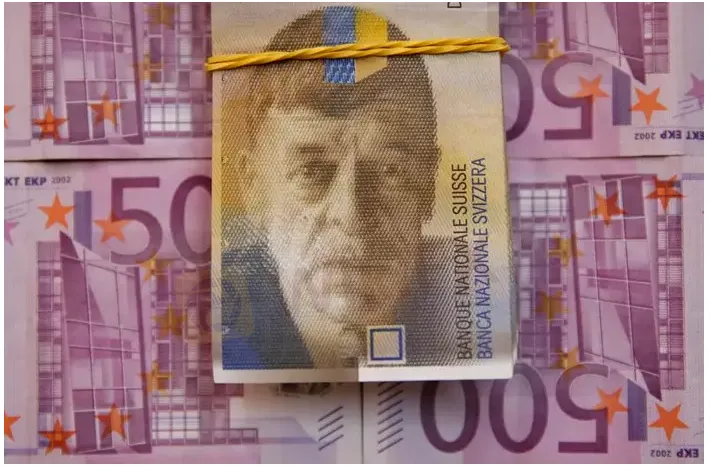简体中文
繁體中文
English
Pусский
日本語
ภาษาไทย
Tiếng Việt
Bahasa Indonesia
Español
हिन्दी
Filippiiniläinen
Français
Deutsch
Português
Türkçe
한국어
العربية
Swiss National Bank spent $6 billion on Q1 FX interventions
Abstract:The Swiss National Bank spent 5.74 billion Swiss francs ($6.01 billion) on foreign currencies during the first quarter of 2022, it said on Thursday, scaling back its operations to curb the safe-haven franc’s strength versus the last quarter of 2021.

The figure was less than the 12.63 billion francs the SNB spent between October and December but more than the 296 million francs it spent during the first quarter of 2021.
The Swiss franc briefly rose above parity versus the euro at the start of 2022 as the reemergence of COVID-19 in China and the war in Ukraine sent investors looking for safe havens.
Foreign currency purchases have been a cornerstone of SNB policy for years to slow the appreciation of the franc, whose high value made life difficult for Swiss exporters by making their products more expensive abroad.
But the SNB this month said the franc, despite its high nominal valuation, was no longer highly valued due to higher inflation in other countries.
The SNB has switched its focus to increasing interest rates, raising its policy rate for the first time in 15 years to fight rising inflation in Switzerland.
On Thursday the euro was trading at around 0.9970 francs.
Analysts have said the SNB seemed to be accepting the francs higher value and was holding off from interventions at present.
Still the SNB has warned it could be active in the currency market, saying this month it would intervene to check an “excessive appreciation” of the franc and also consider selling foreign currency if the franc were to weaken.
($1 = 0.9557 Swiss francs)

Disclaimer:
The views in this article only represent the author's personal views, and do not constitute investment advice on this platform. This platform does not guarantee the accuracy, completeness and timeliness of the information in the article, and will not be liable for any loss caused by the use of or reliance on the information in the article.
Read more

The Daily Habits of a Profitable Trader
Every professional trader follows a structured approach to ensure they are well-prepared, disciplined, and able to seize opportunities with confidence. Whether you are a seasoned investor or an aspiring trader, adhering to a robust daily checklist can significantly enhance your performance. Use this checklist to check if you are a qualified trader

The Impact of Interest Rate Decisions on the Forex Market
Interest rate changes determine currency attractiveness, influencing capital flows and exchange rate trends. Understanding this mechanism helps investors navigate the forex market effectively.

How a Housewife Lost RM288,235 in a Facebook Investment Scam
A 47-year-old housewife in Malaysia recently fell victim to an online investment scam, losing a substantial sum of RM288,235 after engaging with a fraudulent scheme advertised on Facebook.

A Trader’s Worst Mistake: Overlooking Broker Reviews Could Cost You Everything
In today’s digital age, reviews influence nearly every decision we make. When purchasing a smartphone, television, or home appliance, we pore over customer feedback and expert opinions to ensure we’re making the right choice. So why is it that, when it comes to choosing an online broker where real money and financial security are at stake many traders neglect the crucial step of reading reviews?
WikiFX Broker
Latest News
The Withdrawal Trap: How Scam Brokers Lure Victims into Paying More
FCA to Investors: Think Twice Before Trusting These Brokers
Trump\s tariffs: How could they affect the UK and your money
Trump gambles it all on global tariffs he\s wanted for decades
TradingView Brings Live Market Charts to Telegram Users with New Mini App
Trump tariffs: How will India navigate a world on the brink of a trade war?
Interactive Brokers Launches Forecast Contracts in Canada for Market Predictions
Authorities Alert: MAS Impersonation Scam Hits Singapore
Stocks fall again as Trump tariff jitters continue
IG Group Acquires Freetrade for £160M to Expand UK Investment Market
Currency Calculator







